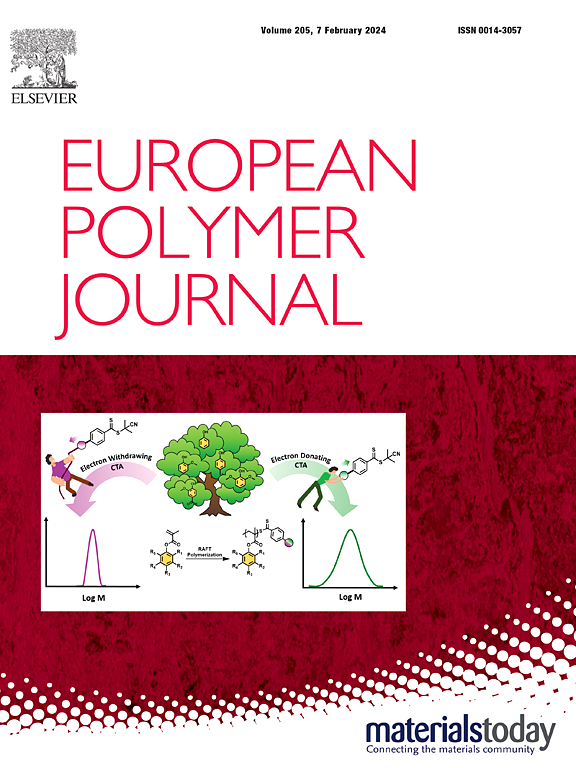Development of a functionalized polystyrene platform from packaging waste via Friedel-Craft acylation
IF 6.3
2区 化学
Q1 POLYMER SCIENCE
引用次数: 0
Abstract
Through a circular economy approach, expanded polystyrene (EPS) waste can address the need to develop new low-impact materials suitable for packaging, adhesives, and even protective coatings needed for buildings and works of art. In this study, waste Polystyrene (PS) has been chemically modified with increasing feeds of maleic anhydride (MA), using a Lewis acid as a cationic activator (AlCl3) via Friedel-Crafts acylation. As a result, a novel library of polymer, renamed PS-MA, was synthesized by developing a “one pot” acylation reaction protocol. Nuclear Magnetic Resonance (NMR) and Attenuated Total Reflection Fourier Transform Infrared Spectroscopy (ATR-FTIR) assessed the functionalization of PS with MA. PS-MA physicochemical properties were investigated through Differential Scanning Calorimetry (DSC), Thermogravimetric analysis (TGA), and Size Exclusion Chromatography (SEC), linking the characterization of the crosslinked structure with the functionalization degree. Finally, solubility tests yielded the Hansen Solubility Parameters (HSP) and Teas Triangle solubility windows of the new materials. Noticeably, the new PS-MA can be solubilized in green solvents, making its processability in chemical and industrial applications more sustainable than traditional PS. Overall, a new platform of PS-MA with tunable properties was formulated, which stands as an example of functionalized materials obtained from waste through a sustainable synthetic path, with promising impact in numerous industrial and processing sectors.

利用包装废弃物经Friedel-Craft酰化制备功能化聚苯乙烯平台
通过循环经济方法,发泡聚苯乙烯(EPS)废物可以满足开发新的低影响材料的需求,这些材料适用于包装、粘合剂,甚至建筑和艺术品所需的保护涂层。本研究以一种Lewis酸(AlCl3)为阳离子活化剂,通过Friedel-Crafts酰化反应,对废聚苯乙烯(PS)进行化学改性,增加马来酸酐(MA)的投加量。因此,通过“一锅”酰化反应方案,合成了一个新的聚合物库,命名为PS-MA。核磁共振(NMR)和衰减全反射傅立叶变换红外光谱(ATR-FTIR)用MA评价了PS的功能化。通过差示扫描量热法(DSC)、热重分析(TGA)和粒径排除色谱法(SEC)研究了PS-MA的理化性质,将交联结构的表征与功能化程度联系起来。最后,通过溶解度测试得到了新材料的Hansen溶解度参数(HSP)和Teas三角溶解度窗口。值得注意的是,新型PS- ma可以在绿色溶剂中溶解,使其在化学和工业应用中的可加工性比传统PS更具可持续性。总体而言,一个具有可调性能的PS- ma新平台被制定,这是通过可持续合成途径从废物中获得功能化材料的一个例子,在许多工业和加工领域具有前景的影响。
本文章由计算机程序翻译,如有差异,请以英文原文为准。
求助全文
约1分钟内获得全文
求助全文
来源期刊

European Polymer Journal
化学-高分子科学
CiteScore
9.90
自引率
10.00%
发文量
691
审稿时长
23 days
期刊介绍:
European Polymer Journal is dedicated to publishing work on fundamental and applied polymer chemistry and macromolecular materials. The journal covers all aspects of polymer synthesis, including polymerization mechanisms and chemical functional transformations, with a focus on novel polymers and the relationships between molecular structure and polymer properties. In addition, we welcome submissions on bio-based or renewable polymers, stimuli-responsive systems and polymer bio-hybrids. European Polymer Journal also publishes research on the biomedical application of polymers, including drug delivery and regenerative medicine. The main scope is covered but not limited to the following core research areas:
Polymer synthesis and functionalization
• Novel synthetic routes for polymerization, functional modification, controlled/living polymerization and precision polymers.
Stimuli-responsive polymers
• Including shape memory and self-healing polymers.
Supramolecular polymers and self-assembly
• Molecular recognition and higher order polymer structures.
Renewable and sustainable polymers
• Bio-based, biodegradable and anti-microbial polymers and polymeric bio-nanocomposites.
Polymers at interfaces and surfaces
• Chemistry and engineering of surfaces with biological relevance, including patterning, antifouling polymers and polymers for membrane applications.
Biomedical applications and nanomedicine
• Polymers for regenerative medicine, drug delivery molecular release and gene therapy
The scope of European Polymer Journal no longer includes Polymer Physics.
 求助内容:
求助内容: 应助结果提醒方式:
应助结果提醒方式:


